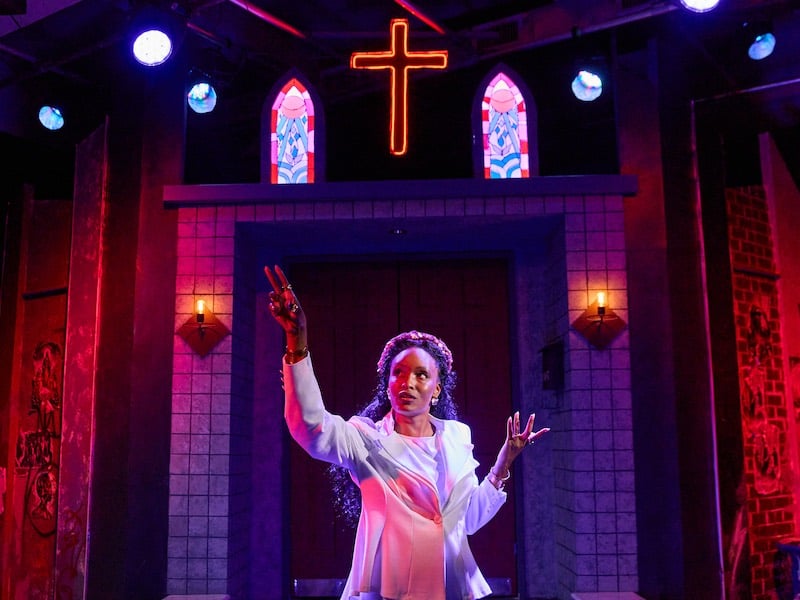Making new myths from old ones is among theater’s fundamental functions — rejiggering received master plots into modern narratives with fresh resonance. Spooky Action Theater has committed its 20th season precisely to this purpose, “the task of giving life to new myths,” in the words of artistic director Elizabeth Dinkova, “stories of wonder and magic that illuminate the most intimate aspects of our contemporary humanity.” Tackling the tricky challenge in that task is Christopher T. Hampton’s wildly imagined Cracking Zeus, his first produced play, incubated by Spooky Action and staged in a striking world premiere directed by Reginald L. Douglas, artistic director of Mosaic Theater.
At the play’s empathic heart is an earnest, decent, and slightly dweeby young man named Baniaha (Charles Franklin IV), whose authoritative mother, Momma Jo (Lolita Marie), is the founder and pastor of an urban church where Baniaha plays organ and dedicatedly conducts a not-ready-for-Sunday choir of orphaned street kids. His problem, we learn, is that he believes he can’t know himself unless he can know who his father is — and his momma won’t say.

At this juncture, Hampton summons theatrical legerdemain and introduces the miraculous backstory of Baniaha’s paternity: Baniaha’s papa was none other than the horndog Greek god Zeus. The adulterous dude (he was married to Hera) came down from Mount Olympus and, as was his philandering wont, one drunken night at a disco knocked up the enraptured chick who would become the Rev. Jo.
Let us pause for a moment to ponder this epic nonbiblical begat. In one fell shtoop, we get an audacious mashup of theologies: On one hand, an inseminating emissary from a Greek pantheon populated by more deities than anyone can keep track of. On the other, a wayward young woman who turned her life around and became a devout devotee of the mono-God-who-counts-as-three. Any way you do the math, it doesn’t compute. So what then of Baniaha’s future? Does he even have a prayer?
Crack cocaine figures prominently in Hampton’s quirky storyline as his title Cracking Zeus foreshadows, and the illicit substance’s power to induce something like religiosity is also implicit. At the top of the play, we meet an unhoused character named Rufus, flying high on crack, who sleeps on the street outside the church front and becomes a kind of counselor to Baniaha. DeJeanette Horne plays Rufus with a raw, restless mania that’s magnetic.
Also dropping in from Mount Olympus is Zeus’ betrayed wife Hera (“In my home I am queen and I rule all I survey”), who in classic Greek mythology is notorious for going around avenging her husband’s adultery — on everyone but him. Here, she makes clear, she intends to take out her wrath on Baniaha, and the means by which she tries to do so, addict him to “ambrosia,” is, well, problematic. Nicole Ruthmarie manages to make this villainous character perversely intriguing, in a comic book kind of way, as she declaims some of the script’s most stentorian speeches wearing a stunningly sleek white pantsuit (Cidney Forkpah did the excellent costumes).

Charles Franklin IV as Baniaha impresses in the play’s most complex character arc. At the beginning he’s a nice guy but lost, coaching and cheering on the choir members, helping out his momma, but seeming to feel a weight that won’t lift. His dramatically empowered transformation once Hera has her way with him is a hybrid of hopeful and troubling that may well leave one mulling. He wins no prize-son points when, juiced by Zeus, he tells off his mother:
Baniaha: I will not kneel before any lesser god. I require ambrosia. I need ambrosia. I will stalk these streets and burn down every wall I see for it. I need the power to get away from here, from this. From you. The only God I will kneel before is myself. I will find my father Zeus and sit beside him on his throne.
Getting the brunt of this neophyte patriarch’s rebuke is Lolita Marie’s Momma Jo, the play’s emotional anchor, who in several terrific big confrontation scenes — with Baniaha, Rufus, and Hera — shows off some of Hampton’s strongest writing, a spiffy wardrobe of churchgoing finery, and an acting range beyond extraordinary.
The delightfully rambunctious chorus of kids — Destiny Jennings, Jacobie Thornton, Christina Daniels, and Dupre Isaiah (a standout) — make multiple appearances, at times in street clothes, at other times in spooky masks and hoods, busily and entertainingly choreographed by Siani Nicole.

There’s a Marvel Universe feel to the show’s esthetic and storytelling style: we’re invited to go along with a cartoonlike cast of characters and a plot made as much of fabulation as of motivation — in which respect Cracking Zeus may be saying something salient about all myths of yore, whether secular or religious.
Still, the dramatic cogency of Cracking Zeus in performance is reliant in no small measure on Reginald L. Douglas’ astutely humanizing direction of a sometimes grandiose script, grounding it always in recognizable emotion, plus the design team’s realization of the play’s credibly everyday world. Barrett Doyle’s scenic design makes palpable the polished white marble steps leading up to a church front topped by a neon cross, on an urban street, bracketed by graffiti and detritus, a trash can here, sneakers hung from a street lamp there. Malory Hartman’s lighting design animates the Spooky Action stage space far beyond its church-basement confines. And most vivid of all, the sound design and original music by Navi — incorporating audible elements of street, sanctuary, and heavens; boom box, organ chords, and thunder — comes close in impact to being a main character in the play.
There is indeed mythmaking magic in Cracking Zeus, with much to mull and ponder, and it’s a theater lover’s high.
Running Time: 90 minutes, no intermission.
Cracking Zeus plays through October 13, 2024 (Thursday, Friday, and Saturday at 7:30 p.m. and Sunday at 2 p.m.), presented by Spooky Action Theater performing at The Universalist National Memorial Church, 1810 16th St NW, Washington, DC. Tickets (general admission, $37.50; students with valid ID, $20; seniors, $32.50; a limited number at $15) are available online.
The program for Cracking Zeus is online here.
COVID Safety: Masks are optional.
Cracking Zeus
By Christopher T. Hampton
Directed by Reginald L. Douglas
CAST
Charles Franklin IV: Baniaha
Lolita Marie: Momma Jo
Nicole Ruthmarie: Hera
DeJeanette Horne: Rufus
Destiny Jennings: Girl 1/Chorus
Jacobie Thornton: Boy 1/Chorus
Christina Daniels: Girl 2/Chorus
Dupre Isaiah: Boy 2/Chorus
Ezinelia Baba, Tre’mon Mills, Jordyn Taylor: Understudies
PRODUCTION
Elizabeth Dinkova: Dramaturgy
Barrett Doyle: Scenic Design
Malory Hartman: Lighting Design
Cidney Forkpah: Costume Design
Navi: Sound Design & Composer
Liz Long: Properties Design
Siani Nicole: Movement Director/Choreographer
Jared Shamberger: Production Stage Manager
Zoe Tompkins: Technical Director
Gillian Drake: Associate Producer
Troy C. Johnson: Assistant Stage Manager
SEE ALSO:
Spooky Action Theater opens 20th-anniversary season with ‘Cracking Zeus’ (news story, September 10, 2024)



